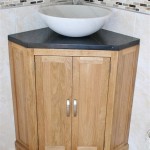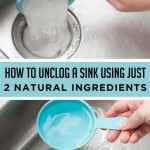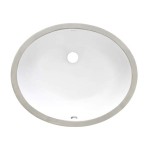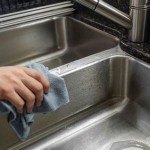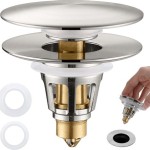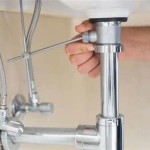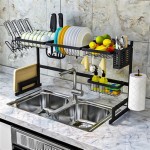Garbage Disposal Sink Not Draining
A kitchen sink equipped with a garbage disposal offers convenience, but encountering drainage issues can disrupt daily routines. Several factors can contribute to a garbage disposal sink not draining properly. Understanding these potential causes and their solutions can help restore functionality quickly and efficiently.
One common culprit is a clogged garbage disposal. Food debris can accumulate within the disposal chamber, particularly if fibrous or starchy items are processed. Additionally, small, hard objects like bones or fruit pits can become lodged, preventing proper grinding and obstructing the drain. Running cold water while operating the disposal can help flush away debris, and periodically grinding ice cubes can help sharpen the blades and dislodge stuck particles.
The disposal's reset button, typically located on the underside of the unit, can trip due to motor overload or electrical issues. If the disposal is not running at all, checking the reset button is a crucial first step. Pressing the button can often resolve the problem. If the reset button continues to trip, it may indicate a more serious electrical problem requiring professional attention.
A clogged sink drain, separate from the disposal itself, can also impede drainage. Grease, soap scum, and food particles can build up in the P-trap, the curved section of pipe beneath the sink. Disconnecting the P-trap and clearing any blockages can restore proper drainage. A plumber's snake can also be used to clear blockages further down the drain line.
Air gaps, installed in some sinks to prevent wastewater backflow, can sometimes become clogged, affecting drainage. The air gap, typically a small, domed fixture on the countertop near the faucet, has an internal drain line that can become blocked with debris. Cleaning the air gap and its drain line can resolve this issue.
A blocked dishwasher drain line connected to the garbage disposal can also cause drainage problems in the sink. If the dishwasher drain is clogged, water can back up into the sink. Checking and clearing the dishwasher drain line, including the air gap if present, can alleviate this issue.
Sometimes, a seemingly clogged garbage disposal sink is actually experiencing slow drainage due to a partially blocked main drain line. This situation often affects multiple plumbing fixtures in the house. If slow drainage is occurring in other sinks, tubs, or toilets, it indicates a potential main drain blockage requiring professional plumbing services.
Regular maintenance can prevent many garbage disposal and sink drainage issues. Running cold water for several seconds before, during, and after operating the disposal can help flush debris. Avoid putting fibrous foods like celery, potato peels, and banana peels down the disposal. Grinding ice cubes regularly can help sharpen blades and dislodge particles. Pouring a mixture of baking soda and vinegar down the drain monthly can help break down grease and soap scum buildup.
Troubleshooting a garbage disposal sink drainage problem often involves a systematic approach. Start by checking the simplest solutions, like the reset button and visible clogs in the disposal chamber. Progress to checking the P-trap and other drain lines. If the problem persists, considering professional assistance can prevent further complications.
Understanding the various components of the garbage disposal system and their potential points of failure is crucial for effective troubleshooting. Familiarizing oneself with basic maintenance practices can significantly reduce the likelihood of encountering drainage issues. Knowing when to call a professional plumber can save time, money, and prevent potential damage to the plumbing system.
Safety precautions are essential when working on plumbing issues. Always turn off the power to the garbage disposal before attempting any repairs or cleaning. Wear appropriate protective gear, such as gloves, to avoid contact with bacteria and debris. If unsure about any procedure, consulting a qualified plumber is always recommended.
While several DIY methods can resolve common drainage problems, certain situations require professional intervention. If the problem persists after attempting basic troubleshooting steps, or if there are signs of more complex issues like electrical malfunctions or main drain blockages, contacting a licensed plumber is the best course of action. Professional plumbers have the expertise and equipment to diagnose and repair complex plumbing issues effectively and safely.
Properly functioning plumbing is essential for a comfortable and hygienic home environment. By understanding the potential causes of garbage disposal sink drainage issues, implementing preventative maintenance, and knowing when to seek professional help, homeowners can maintain a smoothly running kitchen and avoid disruptions caused by plumbing problems.

Most Effective Methods To Fix A Clogged Garbage Disposal

Clogged Kitchen Sink With Garbage Disposal How To Solve Quickly 3 Easy Fixes By Diynate

Garbage Disposal Not Working Try These Easy Fixes 3 Sink Repairs More Tips Tricks

4 Ways To Unclog A Garbage Disposal Wikihow Life

How To Unclog A Garbage Disposal Diy Guide Affresh Appliance Care

How To Fix A Clogged Kitchen Sink On Both Sides

How To Fix A Stuck Humming Or Broken Garbage Disposal Youtube

Garbage Disposal Not Draining Do This Next

How To Unclog A Garbage Disposal Diy Guide Affresh Appliance Care

Garbage Disposal Not Working Diy Tips When Stops
